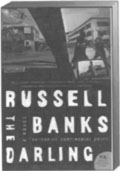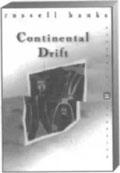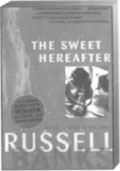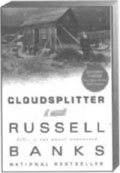Trailerpark (30 page)

It was Captain Knox, his square face in the gentle light cast by the lantern scarlet and angry, clenched like a fist inside the fur-lined hood of his parka. “Ring!” he barked. “This time you've gone too far! Kidnapping! A federal offense, Ring.”
“Get the hell outa here!” Doreen shouted. Merle, wide-eyed and silent, watched from the far corner. Someone grabbed the captain from behind and pulled him away, and Doreen slammed the door shut again. The sound of bodies bumping violently against the outside walls of the bobhouse, shouts, criesâall got caught in the steady roar of the wind and borne away.
“The goddamn old fool!”
“Let me talk to him, let me!”
“Get off! Get off my legs, goddammit!”
The door was flung open yet again, and this time it was Marcelle who was shouting, her voice high and full of fear and anger. “Doreen, get the kid dressed and get the hell out of here so I can talk sense to this crazy old man!” She pushed her way through the doorway, her bulk jamming Doreen against the wall. Maureen had started to cry, then to shriek, and now to wail. Leon LaRoche called to her, “Little girl, little girl, don't cry!” and he pushed his way in behind Marcelle, only to have Terry throw an arm around his neck and drag him backward onto the ice.
“Asshole!” Terry snarled.
“Get off my legs, young man!” It was the Captain shouting at Bruce.
Noni Hubner started screeching. “This is insane! You're all insane!” while her mother Nancy pulled Terry away from Leon and cried, “That's all you people know, violence!”
“Get your hands off him!” Carol warned. “And what the hell do you mean, âyou people'?” she sneered, bringing her face up close to Nancy's.
Nancy slapped the woman's face, then started to bawl and, tears freezing on her cheeks, collapsed to the ice, moaning, “Oh, my God, I'm sorry. I'm so sorry.”
The door to the bobhouse, held back by the press of the people inside, was wide open now, and the light from inside cast a flickering, orange glow over the ice. Claudel, a pint bottle in his hand, clearly drunk, sat a ways from the others with his legs splayed as if he had been thrown there from above. He got himself up on his feet, wobbled for a second and made for the bobhouse, holding his bottle out before him. “Hey! Merle! Lemme talk to 'im! Let's have a drink, Merle, an' we'll git this whole fuckin' thing all straightened out! Lemme talk to 'im. Me ân' him unnerstan' each other,” he said, pawing at Marcelle's shoulder.
Marcelle turned and shoved the man back, and he careened into the darkness. “You just wanta get on his good side, you leech!” she shrieked at the man. Bruce was trying to slide through the doorway past the woman's large body, but she bumped him against the jamb with her chest. “Hold it, pal.”
“No, man, just let me cool things out, just give me a few minutes⦔ he whined.
“Keep the hippy away from him!” bellowed Captain Knox.
“⦠safe-keeping⦔ came a wail from Nancy Hubner. “Just for safe-keeping!”
“Mother's right! Listen to my mother!”
“Get the cigar box!” Leon LaRoche shouted. “It's in the cigar box!”
Terry was on his hands and knees squeezing between Bruce's and Marcelle's legs, one long arm snaking behind Doreen, and then he had it, the cigar box, the money.
Doreen saw him. “Gimme that thing!” She reached for the box.
“I'll take it!” Marcelle cried. “I'm the manager, I'm the one who's responsible for everything!”
Bruce made a grab at the box, grimly and silently. Behind him, Leon had reached in, and the Captain had his hand stuck out, while the others, Nancy, her daughter Noni, the nurse Carol and poor, drunk Claudel, tugged at people's shoulders and backs, trying to pull them away from the door. The wind howled, and the people shouted and swore, and the child wept, and Merle watched, wide-eyed and in silence, while the cigar box went from hand to hand, like a sacred relic, until, as it passed through the doorway, it flapped open and spilled its contents into the wind, scattering the suddenly loose bills into the darkness. People screamed and grabbed at the bills that in a second were gone, driven instantly into the darkness by the wind. Scrambling after the money, the people quickly slipped on the ice and fell over one another and cursed one another, and then were suddenly silent. The box lay open and empty in the circle of light outside the door. The people all lay sprawled on the ice in the darkness just beyond. At the door, holding it open, stood Merle and the little girl. The child was confused, but Merle was weeping.
Â
Here is what happened afterward. All the residents of the trailerpark, except Merle, went back to their trailers that night. By dawn, of course, they all, except for Merle, were out on the ice again, searching for the money. They worked alone and as far from one another as possible, poking through snowdrifts along the shore, checking among the leafless bushes and old dead weeds, the bits of driftwood frozen into the lake, rocks and other obstructions, all the likely places. No doubt many or even all the residents of the trailerpark found money that day, and the next and the next, until one morning, as if by pre-arrangement, no one showed up on the ice. The people who had jobs went back to them; those who ordinarily stayed home did so. No one ever told anyone else whether he or she had been lucky enough to find some of the lost, wind-blown hundred dollar bills, so it's possible that no one, in fact, had been that lucky. More likely, some were and some weren't, but all were ashamed of having tried to acquire it. Besides, everyone had seen up close what happens when your neighbors find out that you have been luckier, even by a little, than they have been.
Merle, naturally, stayed on at the bobhouse for the few weeks of winter that remained. In early March, the ice began to soften and turn mushy in places. Gauzy fogs hung over the wet, pearlescent surface of the lake, obscuring the bobhouse from the trailerpark and erasing the opposite shore altogether. Before long, V's of Canada geese were passing northward overhead, and then, at the weirs, a narrow wedge of open water appeared. Long, shallow pools of water lay resting on top of the ice, swelling and spreading in the sunlight, while beneath the ice deep, dark, slowly warming water chewed its way patiently toward the surface, which gradually got blotchy and pale green and then actually broke away from itself in places, making fissures and wide, tipping plates.
No one knew the exact day Merle left the bobhouse, but one morning there was a sheet of open water where the bobhouse had been, dark water sparkling under the morning sun, and Merle himself was seen by several people that same day outside his trailer somberly scraping the bottom of his old dark green rowboat.
He built another bobhouse the following winter, and as usual spent most of the winter inside it. He never spoke of the lottery money, and you can be sure that no one else ever mentioned it to him, either. Until now, that is, when Merle seems to have gotten over his despair and the others their shame.
R
USSELL
B
ANKS
is the author of
Cloudsplitter, Rule of the Bone
and
Continental Drift
, among other titles. He has received numerous prizes and awards for his work, including the O. Henry and Best American Short Story Awards. He lives in upstate New York and Princeton, New Jersey, where he is the Howard G. B. Clark University Professor at Princeton.
Visit
www.AuthorTracker.com
for exclusive information on your favorite HarperCollins authors.
“The stories that work have the fire and ice that loom over life and the magic that comes from a good story well and craftily told.”
â
Boston Globe
“Each story is uncommonly good ⦠surprising, lively writing and believably human characters⦠Banks has a terrific eye, mordant yet affectionate, for the bric-a-brac and the pathos of the American dream.”
â
Washington Post Book World
“Mesmerizing⦠There are times when Banks's prose fairly dazzles.”
â
Publishers Weekly
Cloudsplitter
Rule of the Bone
The Sweet Hereafter
Affliction
Continental Drift
The Relation of My Imprisonment
Success Stories
The Book of Jamaica
The New World
Hamilton Stark
Family Life
Searching for Survivors

A Novel
ISBN 0-06-095735-2 (paperback)
ISBN 0-694-52423-9 (unabridged CD)
A political/historical thriller of terrorism, political violence, race, and cultures.

ISBN 0-06-095673-9 (paperback)
A story of love and sex, racism and poverty, and the failures of the American dream.

A Novel
ISBN 0-06-092324-5 (paperback)
A small-town morality play that asks: When the worst thing happens, who do you blame?
